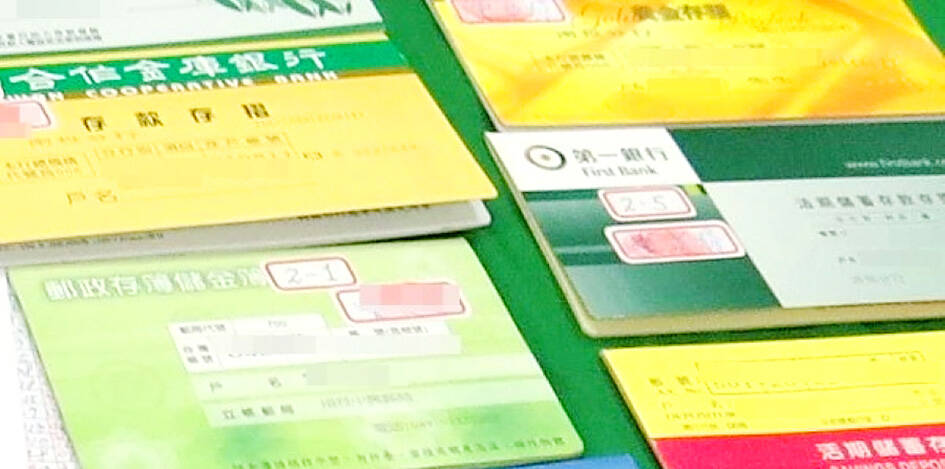The Ministry of Justice (MOJ) has announced an amendment proposal to restrict bank access for five years for people who are found guilty of selling financial accounts or account numbers.
The proposed amendment to the Regulations Governing Accounts Associated With Cases Violating the Money Laundering Control Act (洗錢防制法帳戶、帳號暫停、限制功能或逕予關閉管理辦法) came after amendments to the Money Laundering Control Act (洗錢防制法) passed in May, which introduced a maximum penalty of three years imprisonment, or a fine of up to NT$1 million (US$31,049), for people found guilty of selling financial accounts or account numbers. The earlier amendment was introduced as part of efforts to crack down on financial fraud.
Under the current act, first-time offenders selling one or two accounts would be given a warning, while those selling three or more accounts on the first offense, or violating the law again within five years of a warning, would be subject to fines and imprisonment.

Photo: Taipei Times file
The current act also requires that financial institutions, virtual currency-trading platforms, and third-party payment services close all accounts identified as being associated with such fraudulent activity.
Under the ministry’s proposed amendment to the regulations, people found guilty of a first offense of selling or providing their accounts would have all their accounts in the nation restricted or suspended. Banks would also be required to reject any new account application by these individuals during a five-year restriction period.
The proposal stipulates that those with restricted accounts would not be allowed to deal with more than NT$10,000 a day — including transfers and withdrawals, and transaction fees imposed by the financial institution — for the purpose of paying utilities, fines or other fees.
Only in-person transfer through bank tellers would be permitted, as restricted accounts would be prohibited from accessing online banking (including mobile banking), telephone banking and linking accounts to other payment platforms.
Electronic-payment accounts would be limited to a monthly cumulative maximum of NT$30,000 worth of transactions.
Third-party payment-service providers would be required to limit those under restrictions to only one account, and would not be permitted to provide virtual account services. A minimum of 20 days would be required for funds to be transferred through such a service, and transactions would be capped at NT$20,000, with the monthly cumulative total capped at NT$200,000.
The proposal also calls for the establishment of a system that would permit police to gather transaction information on restricted individuals simultaneously from financial institutions nationwide.

Chinese spouse and influencer Guan Guan’s (關關) residency permit has been revoked for repeatedly posting pro-China videos that threaten national security, the National Immigration Agency confirmed today. Guan Guan has said many controversial statements in her videos posted to Douyin (抖音), including “the red flag will soon be painted all over Taiwan” and “Taiwan is an inseparable part of China,” and expressing hope for expedited reunification. The agency last year received multiple reports alleging that Guan Guan had advocated for armed reunification. After verifying the reports, the agency last month issued a notice requiring her to appear and explain her actions. Guan

GIVE AND TAKE: Blood demand continues to rise each year, while fewer young donors are available due to the nation’s falling birthrate, a doctor said Blood donors can redeem points earned from donations to obtain limited edition Formosan black bear travel mugs, the Kaohsiung Blood Center said yesterday, as it announced a goal of stocking 20,000 units of blood prior to the Lunar New Year. The last month of the lunar year is National Blood Donation Month, when local centers seek to stockpile blood for use during the Lunar New Year holiday. The blood demand in southern Taiwan — including Tainan and Kaohsiung, as well as Chiayi, Pingtung, Penghu and Taitung counties — is about 2,000 units per day, the center said. The donation campaign aims to boost

The Kaohsiung Tourism Bureau audited six hotels in an effort to prevent price gouging ahead of Korean band BTS’ concert tour in the city scheduled for Nov. 19, 21 and 22 this year. The bureau on Friday said that the audits — conducted in response to allegations of unfair pricing posted on social media — found no wrongdoing. These establishments included the local branches of Chateau de Chine, Hotel Nikko, My Humble House, and Grand Hai Lai, it said, adding that the Consumer Protection Commission would have penalized price gougers had the accusations been substantiated. The bureau said the Tourism Development Act

The Central Weather Administration (CWA) said a magnitude 4.9 earthquake that struck off the coast of eastern Taiwan yesterday was an independent event and part of a stress-adjustment process. The earthquake occurred at 4:47pm, with its epicenter at sea about 45.4km south of Yilan County Hall at a depth of 5.9km, the CWA said. The quake's intensity, which gauges the actual effects of a temblor, was highest in several townships in Yilan and neighboring Hualien County, where it measured 4 on Taiwan's seven-tier intensity scale, the CWA said. Lin Po-yu (林柏佑), a division chief at the CWA's Seismological Center, told a news conference